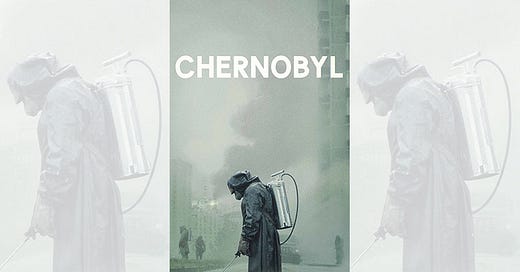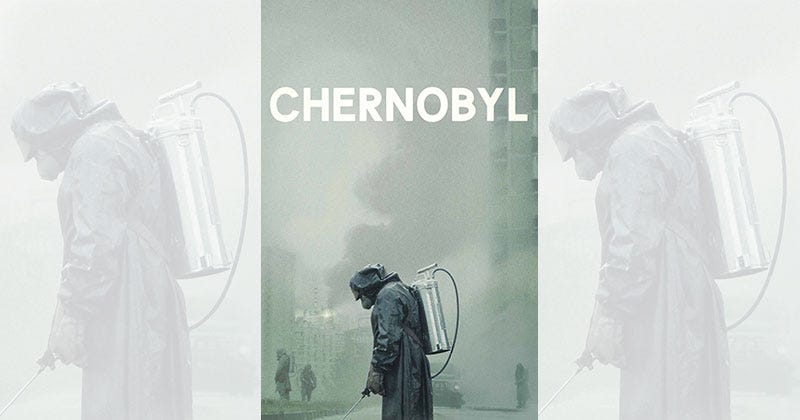HBO’s “Chernobyl” is a must watch
HBO's "Chernobyl" is now available on DVD and streaming. If you didn't see it when it first aired, you definitely should watch it.
Back in May, HBO featured a 5-episode miniseries called “Chernobyl.” Several of the people I follow on Twitter were singing its praises. So was my brother.
But since I don’t have cable of any kind – let alone premium channels like HBO – I had to wait until “Chernobyl” became available for purchase.
Well, it finally did. So I downloaded it from iTunes and watched all five episodes in a row Sunday.
Holy crap is it good! It's probably one of the best dramas I've ever seen.
As is self-evident, “Chernobyl” is about the horrific nuclear accident that occurred in Soviet Ukraine at the Chernobyl power plant in April 1986.
I was 23 when the Chernobyl accident happened. And the news – as limited in detail as it was – was terrifying.
The Chernobyl catastrophe made the partial meltdown at Three Mile Island look like an unpleasant fart by comparison.
What happened at Chernobyl wasn’t a meltdown. Through human error and an unknown design flaw, the reactor core itself exploded. In other words, it was as if a dirty bomb exploded in Ukraine.
And this miniseries captures just how catastrophic Chernobyl was.
To this day, parts of Ukraine and Belarus remain an “exclusion zone.” The level of radiation released during the Chernobyl disaster has left those areas highly toxic. Though, and here’s the odd part, you can visit the exclusion zone. Why anyone would want to is a mystery to me.
Now, “Chernobyl” isn’t an action-packed thriller. It's not "Die Hard," for Pete's sake. But it is gut-wrenchingly suspenseful and extremely compelling to watch. At several points in the series, I was gripping the arms of my chair so tightly, my knuckles turned white.
Of course, my brother’s first question to me was, “What did you think of the radiation burn makeup?” (What can I say? He’s a ghoul.)
And, yeah. The radiation burn makeup was puke-inducing, to put it mildly. Though, thankfully, it wasn't something they spent too much time on.
The film (and that’s what I’m calling this miniseries because watching all five episodes in a row is like watching a 5-hour movie) is brilliantly done. The writing is superb, as is the acting. The cinematography and directing are second-to-none. Even the soundtrack enhances the suspense, terror, and drama of the story.
The only complaint I had is the guy playing Gorbachev looks nothing like him (make-up birthmark notwithstanding). But that's neither here nor there.
“Chernobyl” starts with a short prologue that takes place two years after the accident but then returns to one minute before the core explodes. The scene of the explosion itself is shown from an apartment window in the town of Pripyat just a few kilometers away from the reactor.
What makes this film so compelling isn’t just the story of how they dealt with the aftermath of this horrific event, but how this aftermath was obstructed and carefully controlled by a very paranoid and secretive Soviet state.
Naturally, the party people downplayed the accident as no biggie. They had zero plans of even evacuating the population or telling the Soviet people the true extent of this accident.
But for the fact that the elevated radiation began to be detected outside of the USSR, the Soviets would never have admitted just how bad it was.
At one point, Gorbachev, after complaining about having to apologize to the world for the accident says, “Our power comes from the perception of our power.”
And that pretty much sums it up. The facts on the ground -- namely that Soviet nuclear reactors used unstable isotopes as fuel and were made on the cheap – matter far less to the USSR than the perception they display to the rest of the world -- namely that their nuclear program is state-of-the-art.
The apparatchiks even refused to admit that the core was the cause of the explosion – claiming instead that the radiation levels were caused by water contamination from a tank explosion. The plant executives argued that the true level of radiation was only 3.6 Roentgen. What they refused to acknowledge was the meters they were using maxed out at 3.6.
It isn’t until they enlist the help of Professor Valery Legasov (Jared Harris) that anyone defies the Party narrative and admits the explosion came from the reactor core, and the radiation level was far higher than they were admitting.
It is Legasov, along with Boris Shcherbina -- Minister for Fuel and Energy -- who take the lead in dealing with the catastrophe.
And, of course, all the while Legasov and the others are trying to solve this crisis, they are being watched, recorded, and followed by the KGB.
In one scene, nuclear physicist Ulana Khomyuk (Emily Watson) calls a colleague from another institute about the steps Legasov is taking to put out the fire. The two of them have to speak in code to ensure the KGB doesn't pick up on the fact that they know the extent of the accident.
I’ve watched “Chernobyl” three times since Sunday. It may be a TV miniseries, but it is one of the best-made films I’ve ever seen.
And if you haven’t seen it yet, you really should watch it. It’s definitely worth buying the DVD or streaming version. Hell, check it out from your library if and when they have it. You will not be sorry you did.
Is it completely historically accurate? Of course not. It’s a miniseries, not a documentary. And the truth is, because it happened within a very secretive Soviet Union, we may never know all the facts or the true extent of the catastrophe.
But any historical inaccuracies don’t matter. The film – okay miniseries – is so damn good in and of itself, who cares if it isn’t documentary-level true.
Don’t be surprised if I watch it a fourth or even a fifth time before the Labor Day weekend is over.





